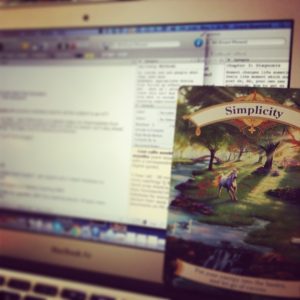Back in December 2019, Grace Quantock stayed at Nant, our Writers’ Retreat Cottage. Grace is a Wellness Provocateur, a writer, coach and trainer. Below, she has written a blog based on writing at a location.
I have always been an advocate for writing anywhere. I have something of an allergy to the notion of creativity needing special space or treatment. It always felt unbearably precious, an unnecessary affectation. As though people haven’t always been writing beautiful prose with whatever space and resources they could scrape together.
It upsets me to think of someone waiting 10 years until they have the time/money to write their novel. I’m not sure how many first drafts can bear the weight of 10 years of expectation. I truly believe a book will be better if you’ve honed your craft with 10 years of practice rather than waiting for the ‘perfect’ moment.
But I wasn’t just passionate about getting pens to pages, but somewhat scathing when I quoted William Blake, believing, “Those who restrain desire, do so because theirs is weak enough to be restrained.” I couldn’t understand how anyone can wait to write a story for that long. How to live with it rattling inside your head, voices unspooling in you on the commute. The shifting, growing landscape of your book’s world leaning into and out of your own life. Living alongside you, this weighty, pungent, peopled world. I need to write it down because I can’t carry that much with me and still hold a coherent conversation.
I’d question the power of stories that waited, dormant, until the perfect environment presented itself. Seeds of stories, I admitted, could lie within us until the conditions are right for their sprouting. We don’t yet know what these will grow into, the shape of them isn’t yet clear; flash fiction, short story, poetry, novel, memoir. The hands that will hold them are not yet open, are they for ourselves, our dear ones, for our wider communities. All that’s in front of them. But whole worlds growing, unuttered and without the work that builds the foundations for such things confused me. Maybe it’s because I never had special space to write in, before. I wrote on whatever was in front of me, in whatever time I had, because I couldn’t not.
“You can write anywhere”, I’d tell myself. “People write from prison, they write on scraps of paper, they tell their story to their survivors so it won’t die alongside them”. You can write here; I wrote my dissertation entirely on public transport, on long, jolty bus journeys between college and jobs and eventually, home. I wrote before hospital appointments (ok, sometimes during appointments), in the car, at the laundrette, on a computer with a broken screen and a tracker pad that randomly jumps back and forth in my text as I type.
One of my favourite writers said, “Plumbers don’t get plumber’s block, when writing is your job, turn up and write”. And I did turn up and write. I wrote the first draft of a book which later helped me win a prestigious fellowship entirely on the train commuting to college. I worked on the basis that I’d either read or write on the train, so I should create rather than consume.
When I came to Tŷ Newydd, I anticipated writing in the gloriously luxurious space of a whole week (and with access to the resources of a computer with an intact screen (mine had cracked a year before) and a working printer). I didn’t really think about the beauty of the space before arriving. Beautiful, unfamiliar spaces aren’t attractive to me, peopled as they are by the ghosts of all the times I’ve been turned away from inaccessible historic spaces before. People like you weren’t around when it was built, I’ve been told. We were, of course, but all too often we were not free (workhouse, asylum, institution).
But my writing at Tŷ Newydd was imbued with something beyond what space to write and access to needed materials can give. I rubbed up against it, agitated by the difference and unable to work it out. It was mid-morning on my second to last day, I was on the window seat in the library overlooking the sea. It was cold, I wore a grey wool hat and my coat which still smelled of campfire smoke from bonfire night. I was writing about swimming in the sea and I was amazed at what unlocked in me. Being close to the space I was writing about was a magnitude of difference from bringing it to mind in my sitting room.
Alexander Chee, author of How to Write an Autobiographical Novel and an associate professor of creative writing at Dartmouth spoke in a recent class about access to space as part of our writerly archives. When we are writing about a time in our lives, a location or experience, we can touch into everything we can to access that space. We might re-read emails from the time, news headlines and when possible, visit the space geographically.
As a therapist, I know how sensations, feelings and recollections can emerge when we find ourselves back in a space where we experienced powerful events within. As writers, we may carefully use our access to a psycho-geography archive in our work. After Tŷ Newydd, I reflected on my capacity to work anywhere. When is it a benefit and where does that tenacity tip into a risk? Because if I can work anywhere, I won’t take steps to get myself to the place I’ll work best. But that’s something my work and the readers I hope will one day hold my words deserve.

